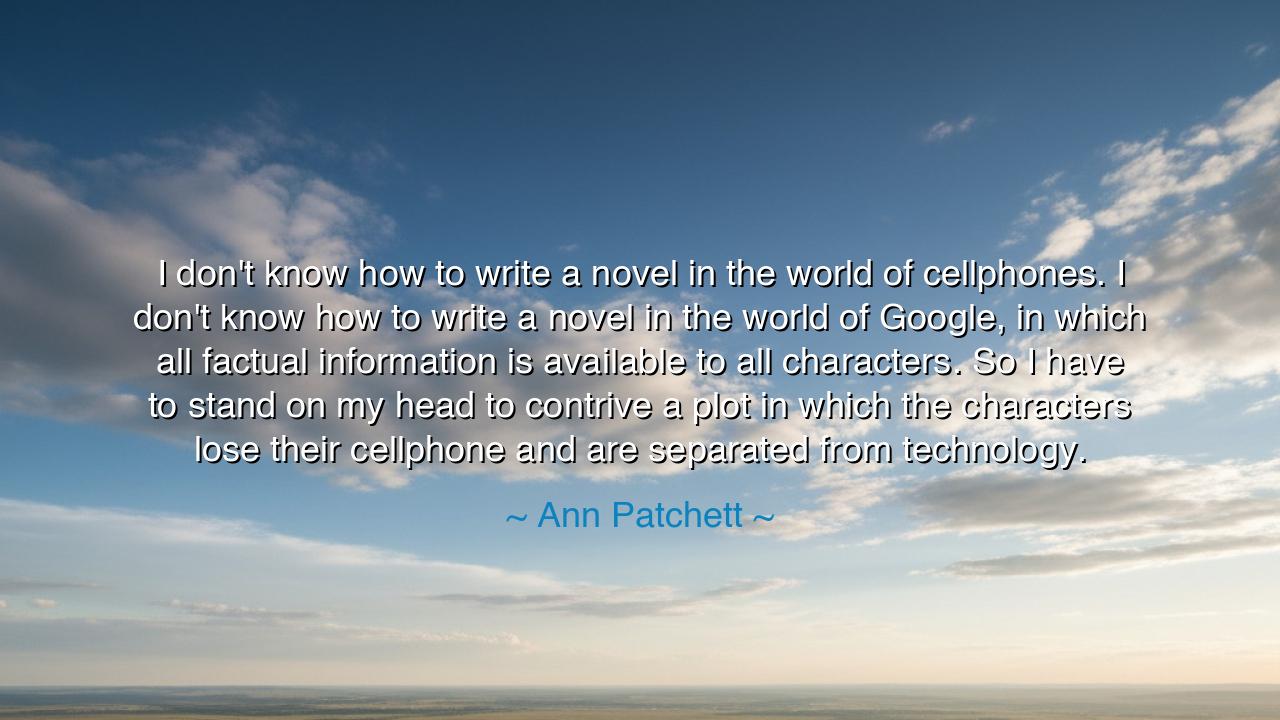
I don't know how to write a novel in the world of cellphones. I
I don't know how to write a novel in the world of cellphones. I don't know how to write a novel in the world of Google, in which all factual information is available to all characters. So I have to stand on my head to contrive a plot in which the characters lose their cellphone and are separated from technology.






Ann Patchett, a weaver of stories, once confessed with striking honesty: “I don’t know how to write a novel in the world of cellphones. I don’t know how to write a novel in the world of Google, in which all factual information is available to all characters. So I have to stand on my head to contrive a plot in which the characters lose their cellphone and are separated from technology.” These words, though clothed in humor, reveal a profound struggle of the modern storyteller: how to create mystery, tension, and human frailty in a world where answers are instantaneous and connections unbroken.
The ancients knew well that every age reshapes the art of storytelling. In the age of oral tradition, suspense grew from distance and delay—would Odysseus ever return, or was he lost forever upon the wine-dark sea? In the age of letters, longing filled the space between sender and receiver, the weeks and months before a reply could come. But now, in the world of cellphones and Google, the space of uncertainty has collapsed. A question no longer lingers; an absence no longer wounds with silence. Patchett speaks of this collapse with sorrow, for the storyteller’s canvas of possibility has grown narrower.
Her words remind us that great stories are born from limitations, from the unknown, from the silence between people. Romeo and Juliet perished because of a letter delayed; Jane Austen’s heroines grew anxious for news that might never arrive. But how would those same stories breathe in an age of instant messaging? A single cellphone might have saved them all. Here lies the heart of Patchett’s struggle: technology, in its brilliance, erases the fertile ground of longing, mystery, and misunderstanding upon which so many tales once grew.
History offers us a vivid example. When the telegraph was invented in the nineteenth century, some mourned that the art of letter writing, with its elegance and anticipation, would fade. Lovers no longer poured their souls into pages carried across seas; generals no longer waited in agony for the rider to arrive. The telegraph shortened distance, but it also stole suspense. So too now with Google and cellphones: they bring knowledge and connection, but at the cost of mystery and delay. Patchett, like the storytellers before her, wrestles with this shift.
Yet her struggle is not defeat—it is adaptation. She says she must “stand on her head,” that she must invent ways to strip her characters of their technology so that they may once again experience peril, doubt, and longing. This act of contrivance is itself a testament to the resilience of storytelling. For though the tools of life change, the human heart does not. We still yearn for stories of separation and reunion, of uncertainty and discovery. If the modern world robs us of these naturally, then the writer must invent circumstances to restore them.
The lesson here is powerful: every new age threatens to flatten the mystery of life, but art will always rise to preserve it. The storyteller must not despair that Google has made all knowledge immediate; instead, they must search for the deeper truths that no search engine can reveal—the secrets of the heart, the longings of the soul, the silences between words. For though cellphones may answer questions, they cannot resolve the mysteries of love, grief, betrayal, and forgiveness.
So, dear listener, hear Patchett’s wisdom: do not be fooled into thinking that technology has ended the need for stories. It has only shifted the terrain, demanding new creativity, new paths, new ways of contriving uncertainty. For as long as humans live, there will be questions that Google cannot answer, and absences that no cellphone can bridge. The storyteller’s task remains eternal: to remind us that knowledge is not the same as wisdom, and that connection is not the same as love. And in this reminder lies the enduring power of the novel.






AAdministratorAdministrator
Welcome, honored guests. Please leave a comment, we will respond soon